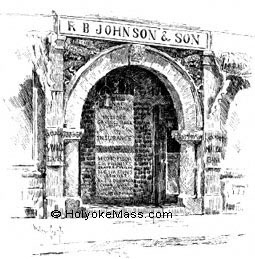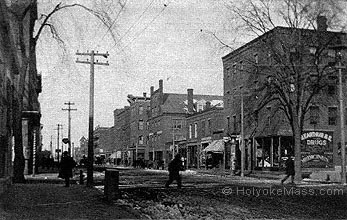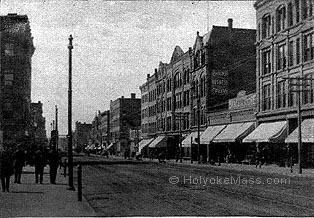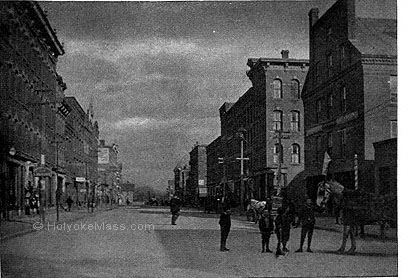
A High Street Entrance
|
There are several more or less tragic bits of history connected with the dam that are worth recording. Some time after the structure was finished, three Irishmen were crossing the river in a boat, just above the fall, when an oar broke. The may rowing became confused and pulled furiously with the remaining oar, but that only served to turn the boat round and round. So the craft was dashed over the dam. But luckily the swift current below swept the men close by a great rock in mid-stream, which they managed to grasp, and soon were ensconced safely on its top and yelling lustily for help. The cry was soon running through the town that there were three men over the dam, and the crowds began at once to gather on the banks. The accident occurred just at the edge of evening on a cold day in autumn, and the plight of the poor fellow out on the rock after their ducking was in no wise enviable.
 High Street, Corner Hampden
High Street, Corner Hampden
|
 High Street, Looking South From Dwight
High Street, Looking South From Dwight
|
Night settled gloomily down, and bonfires were kindled on either bank to show the shipwrecked that hose on shore were planning help. At the Falls and Holyoke there then lived a number of old river boatmen who were familiar with the stream, and from long practice knew how to handle a boat with the greatest skill and dexterity. Four of these men, Isaac Hadley, Levi Dickinson, Sam Ely, and Joseph Ely, manned one of the old flat-boats lying in disuse at the ferry landing, poled it up along shore, crept cautiously out in the bit of water below the dam, which was a little less fierce than that below, took the three men from the rock and shot down through the rapids to safety. It was a desperate undertaking carried bravely through.
Not many years later the leader of these rescuers, Isaac Hadley, met his death here. Mr. Hadley was a sturdy, thickset, powerfully built man, a man greatly looked up to in the community, a man of good judgement, who could always be depended on. He had been captain of one of the old river boats, and had later been an overseer in the constructing of the dam. It thus came about, from his knowledge of the river, boats and the dam, and his general ability and trustworthiness, that he was always called upon to superintend such repairing as was necessary at the dam. In the summer of 1866 he worked for several days stopping a leak which was making trouble. A leak was made apparent by an upward boiling of the water below the fall, and was usually stopped by dumping in quantities of sand bags just above. Before this job was finished the water began to rise rapidly, and on the 20th of August, when Mr. Hadley crossed the ferry to begin work, he remarked that he had never so dreaded to go to his work as he did that morning. But the morning wore quietly away, and at eleven o’clock the job was pronounced done. At this moment the three men noticed the flatboat on which they were working was dragging anchor, and was at the very edge of the dam. The suction of the water on the verge of the fall was terrible. There was no hope. Mr. Hadley called out for each man to take care of himself, and the next instant the boat plunged into the surging waters below. Hadley and one other were drowned. The third man, when he came to himself after the shock, found he was drifting past a rock just below the fall, and he managed to gain a foothold on it. His shouts at once attracted attention, and thousands of people gathered on the banks within a few minutes. A crew of the old watermen was soon found for one of the flatboats. The boat came up along shore, and when it turned its head out into the river, and, tossed on the broken waters, made its uncertain way toward id-stream, the multitude held its breath with anxiety. Now the rock is reached, one man clambers aboard, and a great shout goes up from the crowds on shore. But it is quickly hushed, for the foaming rapids below are still to be passed. Two of the boatmen are at the oars, the other two stand, one on each side, at the bow with poles in hand and a watchful eye on the currents before them. They know the channel adn the suction of every rock. The boat starts on its course and goes straight down through the rapids like a race horse, tossed or guided this way and that in the wild waves, and at times half lost in dashing spray, but presently coming out safe in the quieter waters below. Then the witnessing crowds breathed freely again, and gave vent to their feeling, in long-continued cheering.

High Street, Near Oliver
|
In a little shanty by the canal on the South Hadley side, at the foot of the Glasgow hill, lived Rufus Robinson, in his last years, all alone. He was one of the old boatmen and had the reputation of being the most skillful waterman on the river, and no one had a higher opinion of Rufus Robinson than Rufus Robinson himself. In earlier days he had distinguished himself by piloting down the rapids a steamboat which had been built for use above but proved unprofitable. Now, he thought he could row a boat right across on top of the dam and come to no harm. He was a limber, graceful, daring fellow—a very good sort of person, except for the liquor he let run down his throat. And so, as in many a case before his day and since, he met death through drink. One Sunday, having rowed across the river to shake a dryness he was subject to, he was seen to come down to his boat later with staggering steps, and a few minutes later the boat was dashed over the dam.
© Laurel O’Donnell 1996 - 2006, all rights reserved
This document may be downloaded for personal non-commercial use only
and may not be reproduced or distributed without permission in any format.
This is an edited adaptation from the original publication.
|